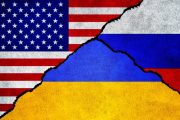
Senator Rand Paul (R-Ky.) on Thursday single-handedly prevented the Senate from passing a $40-billion Ukraine aid package by demanding the bill include a provision requiring oversight of how the money is spent.
Paul, who has already indicated that he will vote against the bill even if his proposal is included, rejected an offer by Senate Majority Leader Charles Schumer (D-N.Y.) and Senate Minority Leader Mitch McConnell (R-Ky.) to hold a separate vote on his proposal as an amendment to the bill.
Both Schumer and McConnell tried to bring the existing bill up for a vote Thursday afternoon, but Paul beat them at their own game. “Under the Senate’s rules any one senator can try to quickly set up a vote or pass a bill,” wrote The Hill, “but it only takes one senator to object.”
Paul didn’t merely object to the hurried attempt to pass a foreign-aid bill with no oversight provisions. He also attacked the bill itself on principle.
“My oath of office is to the U.S. Constitution, not to any foreign nation,” the senator declared. “And no matter how sympathetic the cause, my oath of office is to the national security of the United States of America.”
“We cannot save Ukraine by dooming the U.S. economy,” he continued. He pointed out that inflation “comes from deficit spending,” and Washington’s oceans of red ink have created “one of the highest and most sustained levels of inflation in U.S. history.”
“Americans are feeling the pain,” he said, “and Congress seems intent only on adding to that pain by shoveling more money out the door as fast as they can.”
Paul reminded his colleagues that the United States has been sending aid to Ukraine since 2014, and that if the bill he is blocking passes, Kyiv will have received $60 billion from U.S. taxpayers — “more than every other country in the world spends on their entire military expenditures” and “almost equal [to] the entire military budget of Russia.” Indeed, the Washington Post reported recently that Ukraine is now the top recipient of U.S. military aid, beating out longtime leader Israel.
“And it’s not as if we have that money lying around,” remarked Paul. “We will have to borrow that money from China to send it to Ukraine.”
The senator went on to detail other ways in which the Ukraine aid bill was a bad idea. He stated that it is “more than the U.S. spent during the first year of the U.S. conflict in Afghanistan.” It “towers over domestic priorities as well,” he added, noting that $60 billion is 10 times the amount Washington spends annually on cancer research and larger than the budgets of some Cabinet departments such as the Department of Homeland Security.
Moreover, he observed, other countries are sending unprecedented amounts of aid to Ukraine, so perhaps Uncle Sam could sit this one out. “With a $30-trillion debt,” he said, “America can’t afford to be the world’s policeman.”
Not only that, but getting involved in foreign conflicts, especially by unconstitutional means, tends to make enemies for the United States. As Paul put it on Twitter, the bill is “threatening our own national security, and it’s frankly a slap in the face to millions of taxpayers who are struggling to buy gas, groceries, and find baby formula.”
Schumer and McConnell, naturally, groused about Paul’s thwarting their plans, though they will surely get the Ukraine bill passed sooner or later, with or without his oversight provision. (The House has already passed its own version of the bill.)
Taking note of their response, Donald Trump, Jr. tweeted: “@RandPaul simply wanted an inspector general to oversee how $40 billion of your taxpayer dollars are being spent in Ukraine and the swamp went nuts. They don’t want transparency because it’s one giant kickback to their friends and Big War. I hope you’re awake & watching!”
Ultimately, though, Paul’s objections to the bill are much more fundamental. Oversight or no oversight, he warned, “We should not forget that the Soviet Union collapsed in large part not because it was defeated militarily but because it ran out of money. In an attempt to save Ukraine, will we doom the United States to such a future?”




